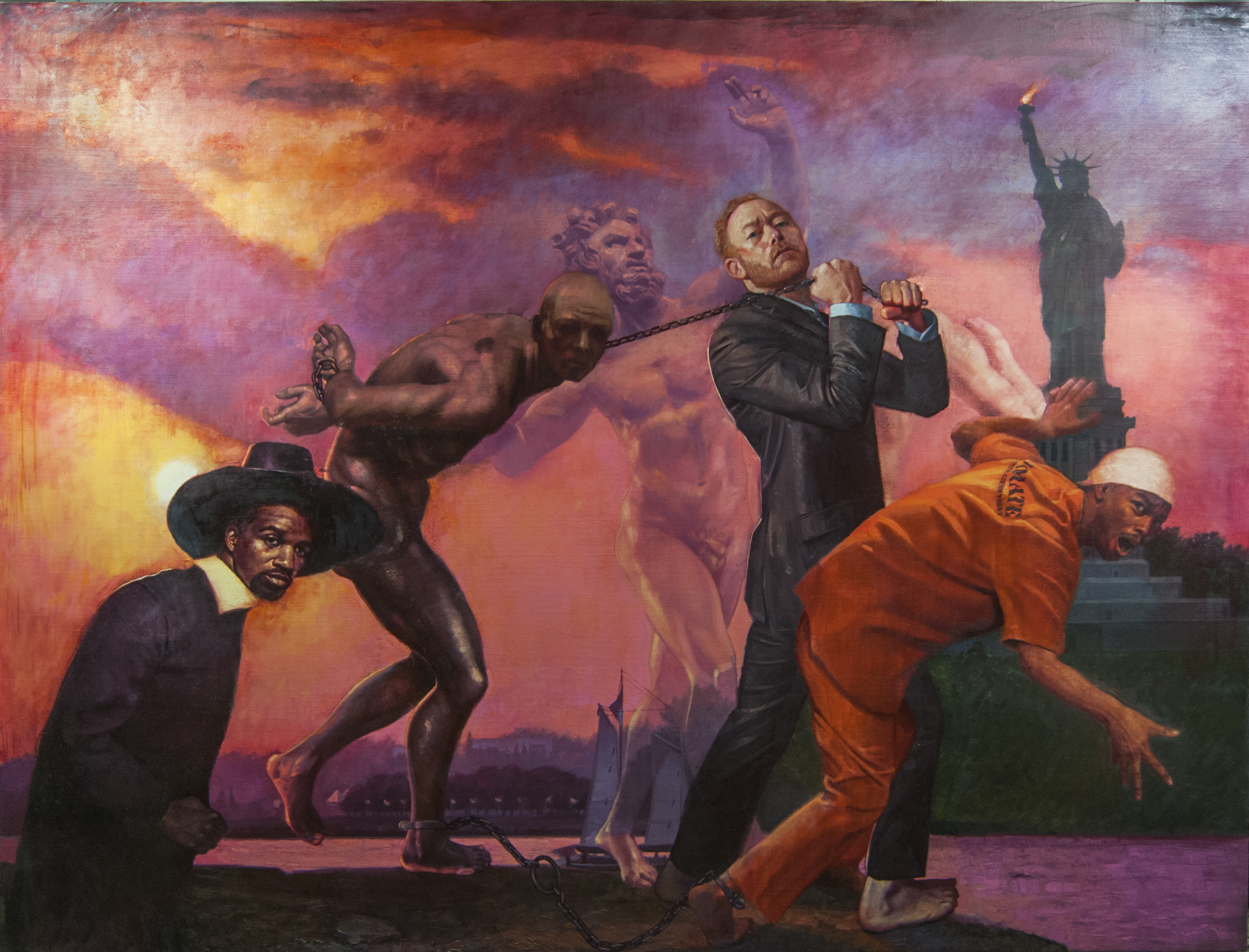New Amsterdam - Artist Statement

New Amsterdam
by Richard Thomas Scott
In our boyhood, we dreamed of America: of revolutionaries and cowboys. We dreamed of brave men conquering the wild frontier, battling their way westward toward the ocean to achieve the natural destiny that God laid before them. We were taught to remember the glory, but not the woe.
As an adolescent I dreamed of the savages on the plains and the slaves in the fields, cumulus clouds bending over their backs, silent in the sepia past. I dreamed of the war between brothers, and the glory of the southern cause. I celebrated abolition and the great march toward freedom, not realizing that it was not my legacy. And now, I must take responsibility for mistaken youth. I lived in the world of fantasy - of white picket fences and suburban cul-de-sacs. But only in my slumber. I did not know that all my life I dreamed white dreams. As troubled as my childhood was, America was my legacy for the taking, and the wealth of the American dream was for me, but it was not for Blacks, or Native Americans, it was not the legacy of women. No, it was built upon their backs. It took me years to understand it myself. What profound romanticism in what we aspire to do, and such tragedy in what has happened! America is a pantheon of martyrs. It is the illicit seduction, the taboo, the forbidden. The American Dream is a warm gun. I learned this on my last day of childhood.
I do not claim to entirely understand experiences I have not had. I did not understand the race riots I’d witnessed years earlier. But what I do understand is that human suffering is comprehensible to all of our species and through empathy we may know the hearts of others if not their experiences. And through that, we might reach them.
I observe that racial tensions have not become a distant memory, and the number of school shootings per year has tripled since 2012. Searching for the roots of this violence, my current work explores the origins of the enduring cultural divides we see expressed violently in our nation, from the divisive political circus, to Charlottesville, Charleston, Sandy Hook, Ferguson, and Baltimore. Searching for a means to communicate across these cultural boundaries, I use the visual language of figurative painting to explore both the European tradition from which the seed of our culture emerged, and new narratives that are fundamentally American.
America is not whole. It is entirely impossible to understand it without understanding the profound scars of our history, without understanding that invisible wound that divides our country between the north and south, between the urban and rural, between empowered and the powerless, which we seem unable to dress and heal. Though in my work I seek answers, I do not presume to answer them myself. The best I can hope is to contribute more nuanced questions. I believe that art can affect the direction of culture. It can inspire more constructive dialogue through distilling and re-contextualizing our present history to reveal different perspectives and transformative experiences. This body of work marks the path of my search, the half remembered phantoms of awakening. It follows my questioning, both those that lead to fertile fields of understanding and those that lead nowhere.
“New Amsterdam” marks both the beginning and the present of the American legacy of slavery. From the origins of the first slaves of the Dutch West India company, who built what has become downtown Manhattan, to the meaning of my own privileged place in the continuum, and ending with the inmate - a victim of mass incarceration - what Michelle Alexander in her book The New Jim Crow calls: a racial caste system. This piece is intended to inspire the viewer to reflect upon their own participation, both intended and not, with both the body of history and the present.
"Perhaps that was, is, the hope of the movement: to awaken the Dreamers, to rouse them to the facts of what their need to be white, to talk like they are white, to think that they are white, which is to think that they are beyond the design flaws of humanity, has done to the world. But you cannot arrange your life around them and the small chance of the Dreamers coming into consciousness. Our moment is too brief. Our bodies are too precious."
-- Ta-Nehisi Coates, Between the World and Me.
